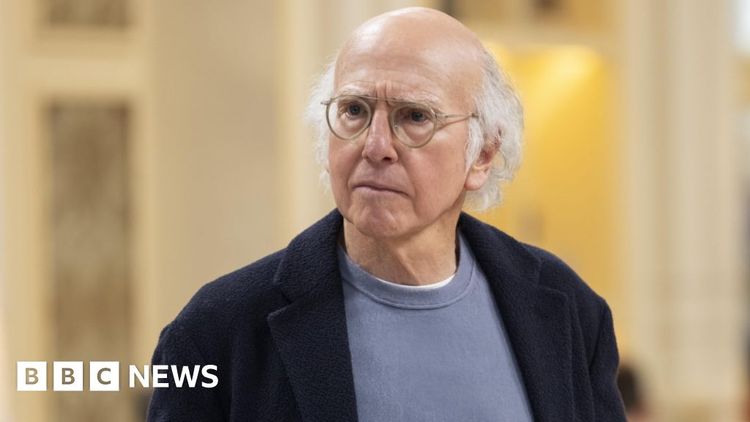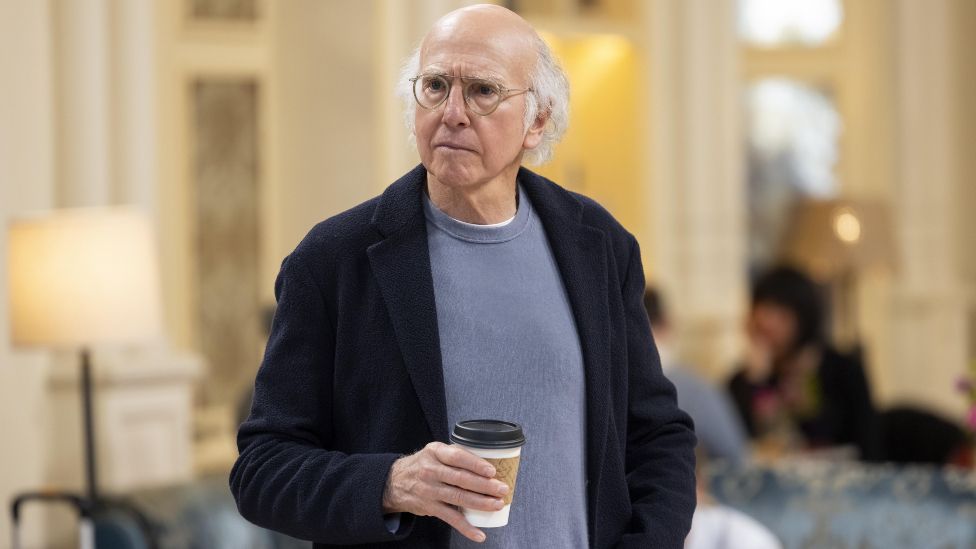Curb Your Enthusiasm: Larry David comedy concludes after 12 series

In the show, Larry David portrays a heightened version of his real-life persona. This television series was restarted in the year 2017.

The comedic show, Curb Your Enthusiasm, ended on Sunday with a final episode that looked back at some of the most memorable moments throughout its 12 seasons. The show used satire to bring humor to its viewers.
Larry David plays a fictionalized version of himself in the HBO series, who is a television writer and producer that lives in Los Angeles. He has mostly retired from his job.
Empire showcased the concluding season and labeled the comedy as a timeless addition to the revered TV comedy collection.
However, the AV Club stated that the concluding part didn't have many unexpected elements.
The first season of Curb Your Enthusiasm ended in the year 2011. However, after a break of six years, the show started once again. The total number of episodes of Curb Your Enthusiasm is one hundred and twenty.
According to Daniel D'Addario of Variety, Curb initially premiered in 1999 as a special before becoming a steady series in 2000. It has been active since the beginning of this century and has evolved by consistently challenging boundaries.
The show has managed to monitor the progress of popular conversation topics at dinner parties for over 20 years, even if it hasn't always done so with the utmost sophistication. Its unique approach of forming spontaneous discussions around a basic storyline has created a new genre of entertainment, although it also results in the show being somewhat unrefined. Therefore, it can be seen as a straightforward tool for entertainment.
Larry and his group of friends have a wild and crazy sense of humor. They are fearless in their approach to life and always know how to have a good time. Watching them engage in friendly competitions against one another is a pure joy. However, they don't often rely on clever tactics or sneakiness.
In the final episode, there was a minor storyline where Leon (played by JB Smoove) finally decided to watch the TV show Seinfeld, which is a comedy.
David writes a simple outline for the main and secondary storylines of every episode, but the actors mainly come up with the dialogue on their own while filming.
According to Charles Bramesco from The Guardian, this method involved generating numerous memorable phrases on the spot.
Throughout the last season, the main storyline involved Larry's ongoing anxiety about potentially violating Georgia's election regulations by accident.
The final episode of the season took place in a courtroom, where different characters from the show appeared to testify. This technique helped to remind viewers of popular storylines from past seasons.
However, in a previously published assessment during the season, Boyd Hilton from Empire expressed his opinion that the most remarkable moments of the show were those that did not particularly contribute to the main storyline.
The fact that David is always searching for anything and everything that could be funny shows how far he will go to get a laugh. Even the most hilarious moments of this season come from scenes where David is visibly angry with either inanimate objects or service industry employees who have no clue about the situation.
These specific parts of the show do not have a clear purpose or destination, but that is not necessary. Fortunately, the show includes some completely absurd comedic performances, which is a relief.
During its airing, Curb Your Enthusiasm has been honored with two Emmy Awards and one Golden Globe recognition.
Many famous people, such as celebrities and news anchors, made guest appearances in the final episode of the show.
In the final episode, there were many allusions to the popular sitcom Seinfeld, which was co-conceived by David. Furthermore, Jerry Seinfeld made a guest appearance in the show.
Curb's final analysis acknowledged various criticisms that David faced for Seinfeld's last installment during the end of the 1990s.
In a side story, Larry's buddy Leon (played by JB Smoove) finally tuned in to Seinfeld's series, offering a chance for him to inquire about the show's conclusion with Larry.
As they talked, Larry found a chance to indirectly respond to the negative comments about his series. He ended up saying, "I don't really care what you think."
After watching the final episode, CNN's Brian Lowry commented that David, in terms of creativity, had undoubtedly gained the authority to bid farewell on his own accord. Therefore, it was not necessary to worry about people's feedback.
However, it was pleasing to observe in the Seinfeld storyline that David was able to chuckle not only at his own expense but also at what has been regarded as one of his only notable blunders for a while.
Larry is known for saying that overall, the outcome was quite satisfactory and even surpassed expectations. Despite his claim during the episode that he hasn't gained any knowledge in his lifetime, if we evaluate this finale against other final episodes of TV series, it implies the opposite.
According to a reviewer from the AV Club, the last episode lacked any real shock factor. The show featured Larry David playing himself, and Sanaa Lathan portraying Sibby Sanders.
During the entire season, there was much anticipation for the Election Integrity Act/water bottle trial which was expected to conclude the Curb Your Enthusiasm show like Seinfeld's two-part finale back in 1998. This was stated in the blog post.
It was bound to happen, but there were also certain factors that contributed to it: one being whether our acquaintance would be found guilty and sentenced to prison, and the other being which of Larry's past wrongdoings would surface and implicate the individual.
Can it be enjoyable to include fan service in a TV show? Yes, it can be okay. Utilizing a court room as a framing device was useful in gathering memorable moments from the first twelve seasons and giving the show a sentimental goodbye (however, this was a concept pioneered first by Seinfeld). Nevertheless, the episode relied excessively on the Seinfeld finale and lacked any elements of surprise.
David Remnick of The New Yorker didn't quite enjoy the last season of the comedy as much due to several reasons, one being the conflict in Israel that served as a real-life backdrop to the show.
"While I was observing, I felt like something was off," he expressed. "I wasn't bothered by the occasional unsuccessful comedic moment, nor was I concerned that the finale of Curb represented the end of something greater than just the series. The type of Jewish comedy that stems from immigrant and second-generation immigrant experiences has been dwindling for quite some time."
The problem wasn't the content itself, but when it was being consumed during a difficult and painful time. It felt inappropriate to focus on the ending of Curb or revisit the Palestinian Chicken episode considering all the suffering and violence that has occurred in the last half-year.
Comedies that mock societal rules and etiquette are only entertaining when society itself hasn't fallen into chaos. The importance of timing is crucial for both humor and real life situations.









































